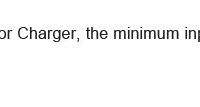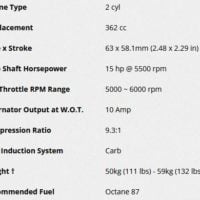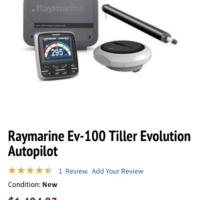Anyone familiar with these? I do a lot of trolling with a kicker motor and steer with my bow mount trolling motor. So I’m wondering if I could wire this charger to work with either motor. I only run one at a time but be nice if it was on with either motor. Thanks
IDO » Forums » Fishing Forums » General Discussion Forum » Minnkota onboard alternator charger
Minnkota onboard alternator charger
-
July 16, 2022 at 10:10 pm #2135777
I have one and use it in VNP on week-long camping trips. It works fine with my Yamaha 50 to keep my Terrova battery charged, but it all depends on how much you use the bow mount and what your alternator output is. A kicker motor might not have the output to do the job. Since you’re using it to steer mostly, it might have enough to keep the trolling battery charged. The charger has a set of wires to connect to the main motor battery posts, a second set for the trolling motor battery posts and a wire to connect to the ignition circuit. You might be able to install a switch at that wire to connect to both motors’ ignition switches, but I don’t know. In my case, I have a single main battery at the stern and a single trolling battery at the bow. The cables are only 6 feet long, and I had to extend one to reach my trolling motor battery. Here’s a link to the installation manual:
https://johnsonoutdoors.widen.net/content/wxh8npehmk/original/Alternator-Charger-Manual.pdfJuly 16, 2022 at 10:20 pm #2135779I’m watching some install videos and it seems to me the purple ignition wire just needs to go to a wire that has power when a motor is on. So I would think I could just put it on a switch to give it power when a motor is on and then it really doesn’t need to know what motor is on as long as it gets power it’s on. My kicker I think shows around thirteen volts so I would think that would be enough for it to work.
July 17, 2022 at 9:52 am #2135808One of the u tube install videos showed a guy hooking that purple “ignition wire “ up to his stereo amplifier wire that only gets power when his ignition is on. I think any 12 volt power wire that cuts out with your ignition would be fine. I’ll find out anyway it’s on its way
July 17, 2022 at 9:38 pm #2135915My kicker I think shows around thirteen volts so I would think that would be enough for it to work.
Yes, your kicker should put out 12-13 volts, but you need the amps as listed below “to achieve full output”.
July 18, 2022 at 5:47 am #2135926<div class=”d4p-bbt-quote-title”>Gino wrote:</div>
My kicker I think shows around thirteen volts so I would think that would be enough for it to work.Yes, your kicker should put out 12-13 volts, but you need the amps as listed below “to achieve full output”.
Thanks, I read the manual in your link in the other thread. It looks like the main motor will only put out enough amps, bummer. It sounds like Yamaha 9.9 puts out the least amount of amps out of all the big three.
July 18, 2022 at 9:54 pm #2136167WOW, your link really does not give me even close to enough info for this application.
Are you sure the link you provided was the right one?July 18, 2022 at 9:57 pm #2136168Here is what I researched from Drizzy’s link,
“DC-DC Converters are used to step up or step down DC Voltages. This model is a step down converer and is used to power 12 Volt devices on vehicles and boats with 24 Volt DC Systems. Its 70 Amp output makes it suitable for powering a variety of higher powered 12 volt devices including Satellite TV tracking systems, VHF radios, Stereos, Scanners, SSB’s etc.
Input voltage range 18-35 Volts
Output volage is factory set to 13.2 Volts but can be user adjusted between 10 and 15 Volts
Continuous output current 70 Amps
Max momentary output current 85 Amps
Off load current < 20 mA
Remote On-Off capable
Temperature controlled fan assisted cooling
Can be used as a 12 volt charger powered from a 24 volt system
DC Connection – M6 bolts
Dimensions 2.6″x3.5″x7.7″ Weight 2.0 Lbs”July 19, 2022 at 5:41 am #2136173Here is what I researched from Drizzy’s link,
“DC-DC Converters are used to step up or step down DC Voltages. This model is a step down converer and is used to power 12 Volt devices on vehicles and boats with 24 Volt DC Systems. Its 70 Amp output makes it suitable for powering a variety of higher powered 12 volt devices including Satellite TV tracking systems, VHF radios, Stereos, Scanners, SSB’s etc.
Input voltage range 18-35 Volts
Output volage is factory set to 13.2 Volts but can be user adjusted between 10 and 15 Volts
Continuous output current 70 Amps
Max momentary output current 85 Amps
Off load current < 20 mA
Remote On-Off capable
Temperature controlled fan assisted cooling
Can be used as a 12 volt charger powered from a 24 volt system
DC Connection – M6 bolts
Dimensions 2.6″x3.5″x7.7″ Weight 2.0 Lbs”Yeah, that’s definitely not what I’m looking for. I went to their website and they do have some different models but none of them said anything about using it to charge two trolling motor battery’s off a outboard
 CaptainMusky
Posts: 25416July 19, 2022 at 8:37 am #2136201
CaptainMusky
Posts: 25416July 19, 2022 at 8:37 am #2136201I have a Stealth DC Alternator charger. Used it for several years and absolutely love it. I doubt you will get enough amperage off a kicker to sufficiently charge anything however. I can recharge my trolling motor batteries at idle speeds with my outboard however. I spend a week each June in Canada on an island and havent plugged my boat in since I installed it. Works very well. I only get annoyed by the other guys running their generators to charge their boats while mine sits there quietly.
July 19, 2022 at 10:31 am #2136220Same here, I’ve had a Stealth DC in my last three boats and they are awesome. On days where I make longer runs with the big motor, my trolling batteries are fully charged when I get back to the dock each night.
July 19, 2022 at 12:12 pm #2136242Same here, I’ve had a Stealth DC in my last three boats and they are awesome. On days where I make longer runs with the big motor, my trolling batteries are fully charged when I get back to the dock each night.
I was more trying to find a way to keep my trolling batterys working longer while salmon fishing. I get about four to five hours on them steering my kicker. It’s mostly on auto pilot and cruise control.
 CaptainMusky
Posts: 25416July 19, 2022 at 12:24 pm #2136246
CaptainMusky
Posts: 25416July 19, 2022 at 12:24 pm #2136246Like I mentioned I highly doubt your kicker will put out enough juice to provide any meaningful charge to your trolling motor batteries. You could hook it to your outboard and just idling should be sufficient for most big 4 strokes. I have a 150 suzuki and it kicks out plenty of amps just at idle.
 Ripjiggen
Posts: 13288July 19, 2022 at 12:37 pm #2136248
Ripjiggen
Posts: 13288July 19, 2022 at 12:37 pm #2136248<div class=”d4p-bbt-quote-title”>Brian G wrote:</div>
Same here, I’ve had a Stealth DC in my last three boats and they are awesome. On days where I make longer runs with the big motor, my trolling batteries are fully charged when I get back to the dock each night.I was more trying to find a way to keep my trolling batterys working longer while salmon fishing. I get about four to five hours on them steering my kicker. It’s mostly on auto pilot and cruise control.
That’s it? What setup are you running should be able to go much longer than that.
July 19, 2022 at 1:02 pm #2136263Just to fill in some info here. Small outboards don’t have an alternator, they generate current from a different device called a stator and while it’s at the same voltage as output from an alternator, the amperage they generate is tiny. Even at full throttle they may generate only 1 amp and at idle it can be best expressed in milliamps.
Larger outboards have alternators which are capable of producing much higher amperage. It’s this higher amperage that gives charging speed.
July 19, 2022 at 2:08 pm #2136303Just to fill in some info here. Small outboards don’t have an alternator, they generate current from a different device called a stator and while it’s at the same voltage as output from an alternator, the amperage they generate is tiny. Even at full throttle they may generate only 1 amp and at idle it can be best expressed in milliamps.
Larger outboards have alternators which are capable of producing much higher amperage. It’s this higher amperage that gives charging speed.
That may be for older outboards, but not today’s models. I’d guess most modern motors used as kickers would have an alternator, because that’s what everybody wants. The Yamaha 15 advertises a 10-amp alternator “at W.O.T.”. RPM’s would be lower than that for trolling, but might still be enough to help maintain the charge.
July 19, 2022 at 2:38 pm #2136324Grouse is right about stator’s, OEM’s don’t want to confuse people because it is essentially a coil of wires like an alternator.
Also here’s more info on the solution I have used with great success. Call me stupid but I’m pretty sure you are looking charge a 12v, 24v, or 36v system using the 12v system on your engine right? FYI your kicker motor won’t do it, running off the main is going to be the only viable solution… luckily idling the main doesn’t burn much fuel.
July 19, 2022 at 3:43 pm #2136365hat may be for older outboards, but not today’s models. I’d guess most modern motors used as kickers would have an alternator, because that’s what everybody wants.
They are using a variation of the stator and while it is technically correct to call it an “alternator” because it produces AC current that must be sent through a rectifier to change it to DC, it’s still not going to produce near the current that the large outboard alternators do.
I haven’t checked a lot of newer 4-stroke motors, but I do recall a 25 HP Yamaha circa 2015 model year produced less than 1 amp at idle and that was within spec. At 1000 RPM I believe the spec was something like 1.5 to 2 amps. So the bottom line is that at trolling speed, you are not likely to put a significant charge into your batteries off of a kicker.
The point is unless you put almost no time on the big outboard getting to and from the fishing, it would be more beneficial to wire the DC to DC to the big outboard because you’ll get more charge off of a 15-20 minute run to the fishing spot and back than you will from a couple of hours spent trolling.
July 19, 2022 at 4:48 pm #2136390Right, I was trying to solve a problem that apparently has not been solved yet. Be nice to troll with the kicker and have it maintain the batteries for the steering and auto pilot.
 Ripjiggen
Posts: 13288July 19, 2022 at 5:00 pm #2136392
Ripjiggen
Posts: 13288July 19, 2022 at 5:00 pm #2136392Still don’t get why you are only getting 4-5 hours with TM. I do the same as you when conditions allow and can go all day. Did this a lot when I had my smaller tiller as well.
July 19, 2022 at 5:37 pm #2136398Still don’t get why you are only getting 4-5 hours with TM. I do the same as you when conditions allow and can go all day. Did this a lot when I had my smaller tiller as well.
I probably need new batteries they are a few years old but I was looking for a solution to the inevitable.
I’m running an altera 24 volt with two interstate 27sJuly 19, 2022 at 7:40 pm #2136421Gino, read your posts more carefully, if salmon fishing is the intended use then you should just buy an autopilot for your kicker…….
July 19, 2022 at 7:58 pm #2136424Gino, read your posts more carefully, if salmon fishing is the intended use then you should just buy an autopilot for your kicker…….
Yeah that would be nice, and expensive. I’m currently set up with all hummingbirds so I think I would have to change to a different brand and I was looking for a cheaper solution.
July 19, 2022 at 8:18 pm #2136426I don’t think your going to find a way to charge enough for both the graphs/starting and trolling batteries. I would get big enough trolling batteries to handle a long day on the water and call it a deal.
July 19, 2022 at 8:26 pm #2136427I don’t think your going to find a way to charge enough for both the graphs/starting and trolling batteries. I would get big enough trolling batteries to handle a long day on the water and call it a deal.
Right, thanks, I was just trying to see what is out there and I got a lot of good feedback!
July 19, 2022 at 8:36 pm #2136431I have an MK-2-DC I have been using for about 10 years to recharge my TM batteries on weeklong trips to Voyageurs like Ron does. The main motor really needs to get up to where the alternator is above 17 amps to be effective in recharging the batteries. Trolling speeds probably won’t be high enough.
FYI, I use a somewhat complicated wiring. I also have an MK-330 on board charger. I use the Minnkota extension cable on the starting battery to a terminal connections point adjacent to the TM batteries. This is where I connect the starting battery connections from the chargers. The 2 TM batteries have connections for both chargers. The TM batteries use a 24V wiring system.
If I were to need to jump the starting battery, I can go from 1 TM battery’s 12V terminals to the terminal connections adjacent to the TM batteries.
You must be logged in to reply to this topic.


